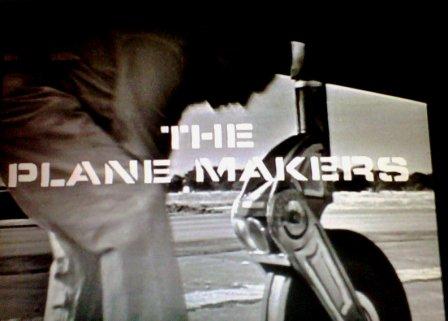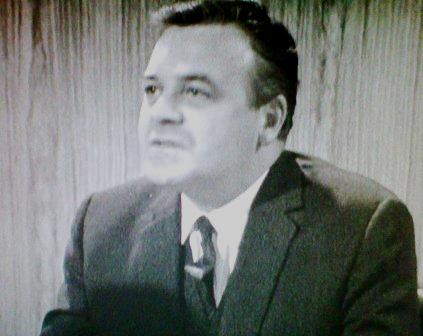

Tuesday 29 December 1964
"Appointment in Brussels" Writer John Gray Director Peter Collinson
“I’m not lost. I just don’t happen to know where I am.” John Wilder
A humorous episode which offers an insight into Wilder's character and features an amusing performance by Gerald Campion as Francis, the English waiter at a Belgian restuarant where Wilder and Challis are stranded.
Sir Gordon Revidge discovers that John Wilder has an appointment to meet Pierre Dagenais (Robin Ford) in Brussels. Dagenais is an old adversary of Revidge’s but his business is commercial aviation, not a military plane like the VTOL. Revidge instructs Laura Challis to accompany Wilder, saying he must know what’s being discussed at the meeting. .
Their plane is forced to land at Ostend due to engine failure. Thick fog shrouds the port and although Wilder hires a car, he ends up driving in a circle back to Ostend. They book in at the Hotel Metropole and spend the evening in a restaurant. The next morning, Laura Challis wakes late and finds that Wilder is breakfasting with Pierre Dagenais.
At the end of the previous episode, also written by John Gray, Pamela Wilder asked, “Are you using Laura Challis or is she using you?”. In this episode, Wilder and Challis spend another evening together, with Challis gently trying to uncover Wilder's secrets. This episode opens with Wilder leaving a Harley Street office (laying the ground for the following episode, “A Hoopla of Haloes”, which would deal with Wilder’s health). During their meal Laura asks, “How serious was that illness? I heard you’d been sick.” Wilder deflects the challenge saying: "the World is sick."
Recorded 1st December 1964 and broadcast between the Christmas and New Year holidays, "Appointment in Brussels" was directed by Peter Collinson, who would go on to make The Italian Job. The episode has comic overtones, but does not inhabit the world of comedy in the same way as ‘Costigan’s Rocket’. The opening scene features Bob Grant (pre-On The Buses) as an obsequious antiques dealer over-charging Wilder £300 for a Chinese vase (which Pamela Wilder subsequently tips off the bedside table when Wilder cancels her trip to Brussels). There are also some amusing scenes of frustration as Wilder spends three hours trying to drive from Ostend to Brussels, only to end with a fog horn underlining his failure as he comes up against a road sign reading ‘Oostende’.The humour underlines the fact that the episode is, on the face of it, a non-event which does not further the ongoing storyline. There are, however, some compensations in an exploration of Wilder’s motivations.
As Wilder and Challis dine, a counterpoint is provided by a rude businessman (Patrick Connor) who is obviously aiming to seduce his secretary (Caron Gardner). Where the businessman is dismissive, Wilder and Challis are amused by the unexpected challenge of their waiter. They accept Francis' suggestions for wine, which Wilder thinks it is over-priced ("you get what you pay for" is the retort) to accompany a three course dinner (minestrone, sole and steak tartare) , whereas the businessman snaps out an order for pizza and Stella Artois, signifying a crude package-tour exoticism.
Francis: "Whisky's a little dreary!" Wilder: "I see there's a touch of tyranny.Perhaps you can suggest something."
The episode is also notable for the casting of Gerald Campion as Francis, the English waiter at Chez Bichette (“I find the continentals very simpatico” says Francis when Wilder ventures that it’s odd to find an Englishman working in Ostend). Campion had played Frank Richards’ schoolboy “Billy Bunter” for the BBC from 1953 to 1961 (he had already been overage from the first episode when he was 29). Just as Patrick Wymark was now becoming a household name through the character of Wilder, Campion had been in demand for public appearances, “opening fetes and pie factories”.
Campion (who was born in a pub and had a reputation as the “slowest and rudest barman in London”) had also run a number of drinking clubs for actors – the most recent of which was Gerry’s Club in Shaftesbury Avenue. At a time when licensing laws meant “the pubs closed as soon as you were thirsty”, private clubs were the only means of getting a drink after the theatres had closed. Remarkably, Campion ran each club from 6pm to 2am while starring in Billy Bunter, cooking, serving drinks and clearing up, before reporting to the BBC’s Lime Grove studios at 8am for rehearsals and performing live in the early evening.
Gerry's was the third club run by Campion (following the Buckstone and the Key Club), and he later established a number of restaurants devoted to French cuisine. He continued to perform after “Billy Bunter”, appearing in films such as “Carry on Sergeant” and “The Comedy Man” and played Morse Hudson in “The Six Napoleons” opposite Jeremy Brett in The Return of Sherlock Holmes (1986). In common with Wymark, Campion had played Mr Toad (1953), and had recently worked with Peter Collinson’s former guardian Noel Coward on 29 November 1964 in a BBC tribute to Winston Churchill called “90 Years On” (Campion had played Graham Moffatt opposite Wilfred Brambell as Moore Marriott).
Patrick Wymark was a member of Gerry's Club, as were many other show business personalities. Nick Triplow notes in Getting Carter: Ted Lewis and the Birth of Brit Noir that, "it was a regular haunt for those in film, television and media and was used by certain members of the press on the understanding that nothing they witnessed there would find its way into the papers." Ted Lewis visited Gerry's Club with actors' agent Peter Crouch and it is likely to have been one of the venues where he quietly observed the "East End boys" who formed the basis of Jack Carter.
The role of Francis is a substantial change to John Gray's original script. The restaurant (Chez Bichette in the transmitted version) was originally "L'Universe", described as having been rebuilt after the war with "nothing quaint or antique about it". In Gray's script the waiter is Armand ("named after my uncle") who is initially unenthusiastic when Wilder and Challis walk in. He consults his watch as if to draw their attention to the lateness of the hour and looks pained when Wilder announces that, "We've come to have a dinner - a very long dinner." In the transmitted version, Campion is briskly polite, glancing at his watch to confirm they have time for dinner before leading them to a table. Armand is something of a sterotype - when the second couple enter, he's distracted by the pretty young girl, handing the menu upside-down to her companion. As Campion plays Francis, he is as at best unimpressed, at most disapproving of the couple.
While the rest of the action sticks close to Gray's original, Armand's dialogue is amended to suit the revised character. When Wilder initially orders a Whisky, Armand disapproves saying, "Whisky does blunt our taste. Perhaps an aperitif" whereas Francis says, "Whisky's a little dreary. Wouldn't you prefer an aperitif?" Where the teleplay does stick to Armand's dialogue, it is generally interpreted by Campion to amusing effect (his uncle was, "a very peculiar man. He used to drink metal polish.") Another significant departure is his final scene. In the script, Wilder overpays Armand and the direction is that the waiter struggles with himself whether to admit this, before Wilder asks if Armand discovered his mistake in the change. "Surely not" Armand replies, to which Wilder responds "My mistake". The direction says that Armand "accepts the compliment". In the broadcast version, Challis and Wilder wait at the door for the change. Offscreen, we hear offscreen Campion yelling at the chef, followed by a clatter of pans. Wilder and Challis shrug at each other and agree to leave the restaurant.
Comparison of the rehearsal script and transmitted version also shows that Wilder's illness was downplayed slightly. In the script he takes a pill from a small box while waiting for Miss Lingard to connect a phone call for him, whereas in the transmitted version Wymark pours himself a glass of water without the pill. Similarly, a shot of Pamela Wilder trying to stick together the pieces of the chinese vase (which she had earlier broken in fury) was deleted from the transmitted version.
As noted above, the episode does not really forward the ongoing storyline and we are left to speculate whether it reveals anything about Wilder. We know that Wilder had originally planned to take Pamela on the trip to Brussels. When he learns that Sir Gordon has also booked Laura Challis on the flight, he has a momentary outburst of fury before deciding there’s more than one way to skin a cat and phoning Revidge to thank him for sending Miss Challis.” He then phones Pamela to say it is no longer convenient for her to come (when he previously asked if she wanted to come on the trip, Pamela had said, “Yes. Very much. Too much.” The vulnerability of Ann Firbank’s delivery is the closest we see to the Pamela Wilder of the previous series).
The twist in this tale is that Wilder had intended Pamela to accompany him because the meeting with Dagenais was personal (to arrange the purchase of a villa from Dagenais). With Laura Challis forced on him, Wilder makes the meeting seem suspicious in order to keep Revidge guessing. It’s therefore debatable whether anything that Wilder discloses during their evening meal is truthful.
When Challis probes Wilder as to what drives him, he tells Challis that the prime motivations are survival, goods and comfort. He questions whether power comes next. “I used to think that power would be sufficient – that when you had it you just pulled the strings and everyone would dance. But they don’t do they?”
He goes on to tell Challis that “if you’re looking for motives it’s not money. I have a ‘gentle sufficiency’. It’s the race that I like.”
“Life is not reward,” he says, “Life is a fact. A process. It can also be an art if you start practicing it early enough. “

Wilder elaborates – “The thing that people never expect a man to be anymore is himself.” Wilder says he is a simple man but admits that he has his fair share of vanity and also enjoys a gamble, “the trouble with taking the simple course is that it’s perfectly obvious to everybody what it is except those who are fools.”
Wilder says if he sees an apple, the simple course is to reach out and take it. But the more entertaining course is to order up a bowl of fruit, and offer a pear to one man, a pomegranate to another and then casually reach out for the apple. "as if it's an afterthought."
Wilder’s thoughts on progress are still relevant today. “Progress is very useful and a lot of men accept a little of it in the certainty that they’ll get some kind of return instead of reaching and gambling for a great deal that’s unsure. So you can spoon a little bit of progress into them like gruel and they feel very good.”
Thanks to the British Film Institute in their help in viewing the archive copy of the Rehearsal Script
For more about the "Predator" VTOL jet featured in this series click here